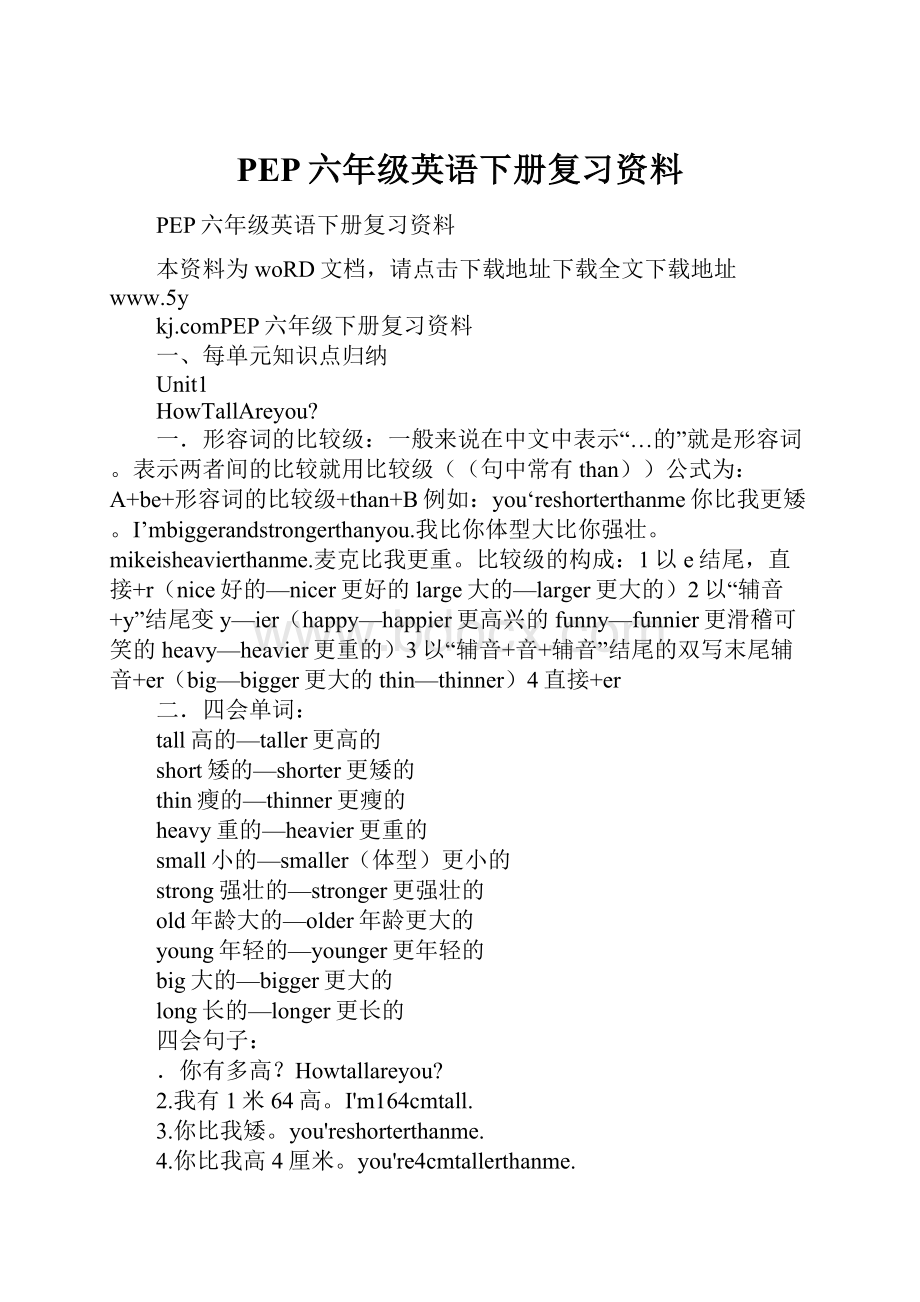PEP六年级英语下册复习资料.docx
《PEP六年级英语下册复习资料.docx》由会员分享,可在线阅读,更多相关《PEP六年级英语下册复习资料.docx(9页珍藏版)》请在冰豆网上搜索。

PEP六年级英语下册复习资料
PEP六年级英语下册复习资料
本资料为woRD文档,请点击下载地址下载全文下载地址www.5y
PEP六年级下册复习资料
一、每单元知识点归纳
Unit1
HowTallAreyou?
一.形容词的比较级:
一般来说在中文中表示“…的”就是形容词。
表示两者间的比较就用比较级((句中常有than))公式为:
A+be+形容词的比较级+than+B例如:
you‘reshorterthanme你比我更矮。
I’mbiggerandstrongerthanyou.我比你体型大比你强壮。
mikeisheavierthanme.麦克比我更重。
比较级的构成:
1以e结尾,直接+r(nice好的—nicer更好的large大的—larger更大的)2以“辅音+y”结尾变y—ier(happy—happier更高兴的funny—funnier更滑稽可笑的heavy—heavier更重的)3以“辅音+音+辅音”结尾的双写末尾辅音+er(big—bigger更大的thin—thinner)4直接+er
二.四会单词:
tall高的—taller更高的
short矮的—shorter更矮的
thin瘦的—thinner更瘦的
heavy重的—heavier更重的
small小的—smaller(体型)更小的
strong强壮的—stronger更强壮的
old年龄大的—older年龄更大的
young年轻的—younger更年轻的
big大的—bigger更大的
long长的—longer更长的
四会句子:
.你有多高?
Howtallareyou?
2.我有1米64高。
I'm164cmtall.
3.你比我矮。
you'reshorterthanme.
4.你比我高4厘米。
you're4cmtallerthanme.
5.你有多重?
Howheavyareyou?
6.我有48公斤重。
I'm48kg.
7.我比你瘦,还比你矮。
I'mthinnerthanyou,andshorter.
8.他的手大一些。
Hishands
are
bigger.
9.他的头小一些。
Hisheadissmaller.
0.Howold(几岁)areyou?
你有多大?
1.I’m11yearsold.我11岁。
2.I’m12.我12岁。
I’moneyearolder
thanyou.我比你大一岁。
3.I’mtwoyearsolderthanyou。
我比你大2岁。
词组:
inthemorning/afternoon/evening
walkto…..步行到
flew(fly)kites放风筝
jumpinto
swamto……..
fiveminuteslater五分钟以后
returned……..to
begratefultosb
Unit2
what’sthematter,mike?
一.四会单词
haveafever(发烧)hurt(疼痛)haveacold(发烧)haveatoothache(牙痛)haveaheadache(头疼)nose(鼻子)haveasorethroat(喉咙痛)
matter(事情麻烦)sore(疼)tired(累的)
excited(兴奋的)
angry(生气的)happy(高兴的)
bored(无聊的)
sad(伤心的)
二.四会句子
你怎么啦?
我发烧了。
what'sthematter?
I
haveafever.
2我喉咙疼。
mythroatissore.
(=Ihaveasorethroat.)
3我鼻子疼。
mynosehurts.(表示身体某一部位疼hurt+s)
4你感觉怎样?
Howdoyoufeel?
5我感觉生病了。
.Ifeelsick..6.我很高兴。
I’mhappy/Ifeelhappy.
7.Amy感觉怎样?
她很累。
HowdoesAmyfeel?
She’stired.
8你好吗,刘云?
你看上去那么高兴。
Howareyou,Liuyun?
youlooksohappy.
9你好吗,Sarah?
你今天看上去那么伤心。
Howareyou,Sarah?
youlooksadtoday.
0.Howareyou,Liuyun?
你好吗,刘云?
youlooksohappy.
你看起来很高兴。
1.Shefeelshappy.=Sheishappy.她很开心.
2.I
feel
happy.=Iamhappy.我很开心.。
3.Iamgoingonabigtrip.我将去旅行
4.Ifailedmymathtest.我数学考试失败了。
5.I’msorrytohearthat.听到这个消息我感到很伤心。
6.Don’tworry别担心
7.Ifyouaresick,seethedoctor.假如你生病了,就去看医生。
8.Takesomemedicineanddrinkhotdrinks.(吃些药,喝热开水。
)
Unit3andunit4
动词一般过去时表示过去发生的事情,公式是:
人+动词过去式+其他+过去的时间。
表示过去的时间是判断过去式的主要标志:
lastweekend上个星期lastyear去年lastmonth上个月yesterday昨天
例如:
Ivisitedmygrandparentslastweekend.上周末我看望了爷爷奶奶。
wuyifanplayedfootballwithhisfriendsyesterday.昨天吴一帆和他的朋友们一起踢足球。
动词过去式变化规则:
.一般在动词末尾加-ed,如ski-skied(滑雪)relax-relaxed(放松)prepare-prepared准备
2.结尾是e加d,如:
taste-tasted(尝起来)
3.末尾只有一个元音字母和一个辅音字母的重读闭音节,应双写末尾的辅音字母,再加-ed,如:
stop-stopped(停止)
4.以“辅音字母+y”结尾的,变y为i,再加-ed,如:
study-studied
carry--carried
直接+ed的动词过去式:
watch(watchedTV看电视)
visitedtheGreatwall(参观长城)
wash—washedtheclothes洗衣服
clean—cleanedtheroom打扫房间
play—playedfootball踢足球
playedbasketball
playedsports进行体育运动
climb-climbedamountain爬山
visit——visitedgrandparents看望爷爷奶奶
cook---cooked做饭
learn-learnedchinese/English/math学习语文/英语/数学
listen—listenedtomusic听音乐
row—rowedaboat划(船)
returmsthtosb把...归还给
returned=gave…backto把…归还给
没有规律的动词的过去式有:
do做---did(didhomework
didher(她的homeworkdidhis他的homeworkdidtheirhomeworkdidourhomework)read-—read(readabook=readbooks读书)go—去went(wenttoapark去公园
wentswimming去游泳
wentfishing去钓鱼
wenthiking去郊游
wentskiing去滑雪
wentice-skating去滑冰wentshopping去购物
sing-sang
dance–danced(sanganddanced唱歌跳舞)take–took(tookpictures拍照)
eat--ate(ategoodfood吃了很多好吃的食物)
buy-—bought(boughtpresents买礼物)seesaw(sawelephants/pandas看见了大象/熊猫)
get–got
isam—was(wuyifanwasbusylastweekend.)
have--had有(EverydayIhadfunwithmycousins每天我和表兄弟都过的很开心)
fly飞——flew(flewkites放风筝)
swim——swam游泳
study——studiedEnglish学习英语
win——wonthegame赢得比赛
(class3wonthegame3班赢得了比赛)leave——left离开(weleftBeijingonFebruary1standgottoHarbinonthe2nd.我们二月一号离开北京二号到达哈尔滨)(werelaxedandpreparedtogobacktoworkorschool.我们放松了一下准备回到工作和学习中)
make–made
asnowman堆雪人
Unit3四会句子:
.-——whatdidyoudolastweekend?
上周末你干了什么?
——Ivisitedmygrandparents.我去拜访了我的爷爷奶奶。
2.——Didyoucleanyourroomyesterday?
你打扫了你的房间了吗?
——yes,Idid。
是的,我打扫过了/No,Ididn’t.不,我没有打扫过。
3.---whatdidmikedoyesterday?
昨天迈克+干了什么?
----Hewentswimming.他去游泳了。
4.johnwasbusylastSunday.上个星期天john很忙碌。
5.Hewashedtheclothesandcleanedtheroominthemorning.早上他了洗衣服,打扫了教室。
Unit4四会句子:
.wheredidyougoonyourholiday?
你在哪儿度假了?
---IwenttoXinjiang.我去x疆了。
2.Howdidyougothere?
你是怎么去儿的?
----Iwentbytrain.我坐火车去的。
3.whatdidyoudothere?
你在那里干吗了?
----Iwentskiing我去滑雪了。
4.whatdidyoudoonyourholiday?
----你假期里去干吗了?
---Iboughtpresents.formyfriends.我给我的朋友买礼物了。
5.Didyoureadbooks?
你读过书吗?
--yes,Idid.是的,我看过。
6.Didyougotoapark?
你有没有去过公园?
No,Ididn’t..不,我没有。
Did+主语+动词原形+其他成分?
用yes,Idid.或No,Ididn’t.来回答.。
what:
什么,问事情问东西;why:
为什么,问原因;where哪里,问地点;who谁,问人;whose谁的,问主人。
whosebookisthis?
这本书是谁的?
It’smysister’s.它是我妹妹的。
Recycle
2
一般将来时表示将来某一时刻的动作或状态,常常与表示将来的时间状语连用。
其表达形式为“begoingto+动词原形”,标志性的时间词:
tomorrow,nextmonday,nextweek等。
四会句子:
whereareyougoingonyourholiday?
假期你打算去哪里?
Iamgoingtokunming.我打算去昆明。
whoareyougoingonwith?
你将和谁一起去?
Iamgoingwithmyparents.我将和我父母一起去。
Howareyougoingthere?
你打算怎么去?
wearegoingbyplane.我们坐飞机去。
whenareyougoing?
你打算什么时候去?
wearegoingthisweekend.我们打算这个周末去。
Haveagoodtime.祝你玩得开心。
二、每单元语法
Unit1HowTallAreyou?
话题:
身体
时态:
比较级在一般现在时中的运用
句型:
1.How引导的特殊疑问句,来谈论对方的身体情况:
---How+(高、矮、胖、瘦等与身体有关的)形容词+areyou?
---I'm+与身体有关的具体数值。
例:
A:
Howtallareyou?
B:
I'm164cmtall.
2.比较级,用来对自己和他人的身体特征进行比较:
---youare+形容词的比较级+thanme.---I'm+形容词的比较级+thanyou.例:
I'mthinnerthanyou.
myhandsarebiggerthanyours.
Unit2what'sthematter,mike?
话题:
身体
时态:
一般现在时
句型:
1.what引导的特殊疑问句,谈论身体上的病痛:
---what'sthematter?
---my+身体器官+is/are+sore./my+身体器官+hurt/hurts./Ihavea+有关病痛的词组。
例:
A:
what'sthematter,Amy?
B:
Ihaveacold.mynosehurts.
2.How引导的特殊疑问句,谈论人们情绪上的感受:
---Howareyou?
youlook+与情绪有关的形容词。
---I'm+形容词。
例:
A:
Howareyou,Liuyun?
youlooksohappy.
B:
yes.I'mexcited.
Unit3Lastweekend
话题:
日常活动
时态:
一般过去时
句型:
1.what引导的特殊疑问句,就过去已经发生的行为动作进行提问:
---whatdidyoudo+时间?
---I+动作(did).例:
A:
whatdidyoudolastweekend?
B:
IPlayedfootball.
2.Did引导的一般疑问句,就过去是否发生了某行为动作进行问答:
---Didyou+动词原形?
---yes,Idid.No,Ididn't.例:
A:
Didyoureadbooks?
B:
yes,Idid.
Unit4myHoliday
话题:
节日
时态:
一般过去时
句型:
综合运用where,when,what,How等词,引导特殊疑问句,就过去
已经发生的行为动作进行提问:
基本句型同上。
例:
A:
wheredidyougoonyourholiday?
B:
IwenttoXinjiang.
三、不定冠词a和an的用法
a用于辅音因素开头的单词前,an用于元音因素开头的因素前
如:
asinger,awriter,apoliceman,asalesperson
记住本学期出现过的用an的单词:
anactor,anactress,anEnglishbook,anartist,anaccountant,anengineer,anorange,anoldwoman
四、
人称代词和物主代词
I(我)—my(我的)
you(你)—your(你们的)we(我们)—our(我们的)
he—his(他的)
she(她)—her(她的)
it(它)—
its(它的)
they(他们,她们,它们)—
their
五、
介词的用法
.
UsuallyIgotoschoolonfoot,sometimesIgobybike.
2.
waitforthesprout.waitfortheflowertogrow.
3.
Seeyouattwoo’clock.
4.
Gostraightforfiveminutes.Thenturnleft.
5.
Itontheleft.
6.
Geton/offatthepostoffice.
六、
用动词的适当形式填空
.
like或者likes后面直接跟动词的ing形式
Ilikemakingkites.
Helikescollectingstamps.
2.
wantto跟动词原形
IwanttobuyanEnglishbookinthebookstore.
Iwanttobeascienceteacheroneday.
3.
can后跟动词原形
Shecanplaytheviolin.
Icanplaybasketball.
4.
begoingto后跟动词原形
whatareyougoingtodoontheweekend?
Iamgoingtovisitmygrandparentsthisweekend.
johnisgoingtobuyapairofshoesintheshoestore.
wearegoingtohaveapicnicnextweek.
5.第三人称单数形式加s或es
Shecleansstreets.
Hehelpssickpeople.
Shereadsnewspapereveryday.
HewatchesTVathome.
Hegoestoworkbysubway.
Heisateacher.HeteachesEnglish.
mypenpallivesinBeijing.
Hestudieshard.
Shehasahappyfamily.
(她有一个快乐的家庭)
6.肯定回答,否定回答
Isthere……?
yes,thereis.
/
No,thereisn’t.
Doeshe……?
yes,hedoes.
/
No,hedoesn’t.
Doesshe……?
yes,shedoes.
/
No,shedoesn’t.www.5y